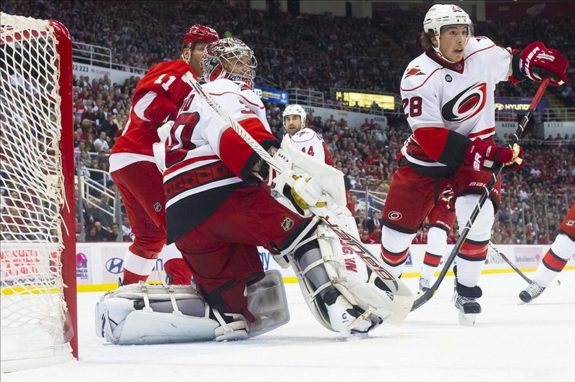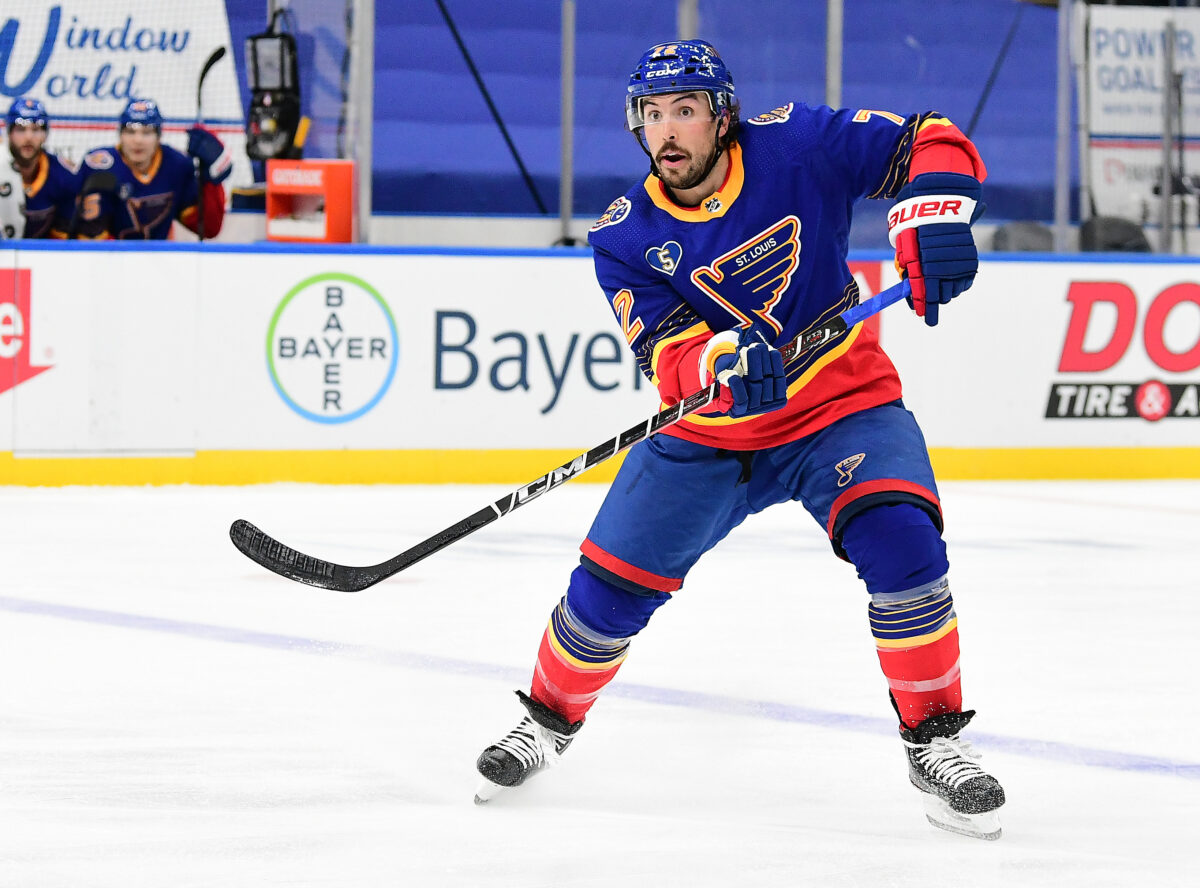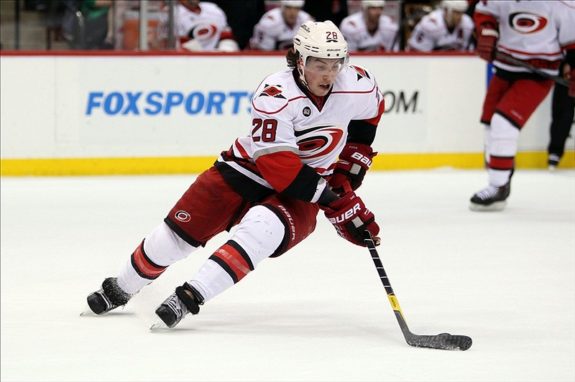In 2020, before the pandemic, Justin Faulk sat alone in the St. Louis Blues’ dressing room as his teammates raised their 2019 championship banner in the Enterprise Center. Faulk was not part of that championship team, and out of respect, stood in the shadows as his Blues teammates had their day in the sun.
But as the Blues defense has evolved – thanks largely in part to injuries and free agency – Faulk finds himself in the eye of the Blues’ defensive storm. This season, the 10-year veteran from Minnesota hopes to prove his legion of doubters wrong. His seventh goal of the season gave the Blues a 2-1 overtime win over the Los Angeles Kings on May 10.
The Blues have had to surmount a ton of problems this season. They lost Alex Pietrangelo to the Vegas Golden Knights in free agency. Then they lost Stanley Cup champion Carl Gunnarsson to a season-ending injury and then sudden retirements of veterans Alex Steen and Jay Bouwmeester. They’ve played with a nicked-up Colton Parayko and Vince Dunn, frequently in and out of the lineup this year as a healthy scratch and with an injury. Faulk, bemoaned by fans early in his tenure with the Blues for inefficient play at a high salary, has worked tirelessly to turn the Blues’ defense around.
“He’s getting more ice, more opportunities, and he’s also earned it, throughout the start of the season,” Blues goalie Jordan Binnington told the St. Louis Post-Dispatch of Faulk. “He’s stepping up in big moments.” (‘Hochman: This season, the Blues’ Justin Faulk plays with a St. Louis versatility seen once in Marshall Faulk,’ St. Louis Post-Dispatch, 2/18/21).
Justin Faulk, not Marshall, has been the Blues’ iron man this season. In his 10th NHL season, he’s having played eight seasons as a reliable defenseman for the Carolina Hurricanes. He came to the Blues in a deal that sent prospect Dominic Bokk and defenseman Joel Edmundson to the ‘Canes in September 2019. Faulk has made three All-Star games and earned first-team All-Rookie team honors in his rookie season of 2011-2012. Marshall Faulk, by the way, led the then-St. Louis Rams to the Super Bowl title. St. Louisans are praying for two ‘faulkin’ championships.
This season, Faulk ranks 13th in the NHL in time on the ice per 60 minutes, averaging 24:31 of ice time for the Blues, entering the May 10 game against the Kings. This is the largest amount of time on the ice Faulk has spent in his career. For his career, he’s averaged 23:06 of time on the ice.
“He does everything for this team,” Blues Coach Craig Berube told reporters in January.
Faulk signed a seven-year, $45.5 million contract extension after the trade from Carolina to St. Louis, according to a story about the deal on NHL.com. His contract has an annual average value of $6.5 million, which began in the 2020-21 NHL season. He previously signed a six-year, $29 million contract (average annual value $4.83 million) with Carolina in 2014.
A Deep, Strong Playoff Resume
“Faulk is a highly motivated guy,” Berube told the Post-Dispatch.
“Justin comes with a very deep and strong resume, a player that’s played in the League for a number of years,” Blues general manager Doug Armstrong told NHL.com at the time of the signing. “He’s 27 years old, in the prime part of his hockey career. We feel he’s tailor-made to today’s NHL, a skater, someone that can transport and move the puck, touches both ends of special teams and has logged a lot of minutes over the years.”
Faulk was the No. 37 pick in the 2010 NHL Draft and played eight seasons for Carolina before arriving in the Gateway City. He had 35 points (11 goals, 24 assists) and was an NHL career-best plus-9 in 82 games that 2019 season when he was an alternate captain. He helped the ‘Canes reach the Eastern Conference Final, where they were swept by the Boston Bruins, who, ironically, lost to the Blues in the Cup Final. With Carolina, Faulk had 258 points (85 goals, 173 assists) and was minus-100 in 559 games, averaging 23:03 of ice time per game.

“He logged a season-high 29 minutes 19 seconds of ice time in (the April 28) 4-3 comeback victory by the Blues over Minnesota,” according to a game recap in the Post-Dispatch. “It was the most playing time for Faulk since his 2015-16 season opener as a member of the Carolina Hurricanes. He played 29:28 that night in Nashville against the Predators. Overall, (his April 28) work was his sixth-most ice time in his 10 NHL seasons.”
Got ‘Skin’ in the Game
“As it turned out, that was just the appetizer” the Post continued. “Less than 24 hours later, Faulk was back on the ice for the Blues against the Wild. Parayko was back in the lineup after missing two games. But Dunn remained sidelined, and Robert Bortuzzo played only 4:53 after two fights resulted in 22 minutes of penalties. (‘Blues notebook: Faulk putting in the time, and then some,’ St. Louis Post-Dispatch, 4/30/21).
“He does a great job,” Berube told the Post-Dispatch. “He’s a heavy guy out there. Works hard. Makes hard plays all the time. Logs a lot of minutes. He’s always getting ‘skin’ out there; it seems like he’s always in the way whether it’s blocking a shot, getting a stick on something, using his body. It’s big-time minutes.”
Over the past two seasons, Armstrong made two major additions to his blueline in trading for and then extending Faulk and signing Torey Krug as a free agent, according to an article in The Hockey Writers. Those moves corresponded with the departure of Edmundson (as part of the trade) and Pietrangelo. “But neither Faulk nor Krug represents the shutdown, stay-at-home defensemen that the Blues typically prized. Both are power-play quarterbacks and puck possession experts, better at putting pressure on the opposition in their own zone rather than neutralizing threats in their own zone,” the article stated.

“The problem is, Faulk’s play continues to resemble someone who fell off the bus between San Antonio and St. Louis,” St. Louis Gametime’s Dan Buffa wrote. “Fans are calling for a return just about every game for the guy, checking the receipt like a mom who got tricked on the price of a toy, which was placed on the wrong rack.”
“Up until the 2019-20 season, Faulk was a money player, putting up at least 35 points per season, and offering the team a heavy shot that fired 200+ lasers on net as well as power-play efficiency. Faulk put up double-digit power-play points in the last five seasons, including 12 goals in 2015-16. What he’s done this season is put up four goals, 14 points, and just three power-play points. That’s not what you expect from a guy making top dollar.”
Better Days Ahead
These days, Faulk is receiving much better reviews. He’s even got his own Blues fan club named after him – The Faulkateers.
“To understand the greatness of Justin Faulk this season, don’t look at the goals” wrote Post-Dispatch columnist Benjamin Hochman on Feb. 18. “Well, wait — let’s look at the goals quickly, because he’s got five already. He had five all last season. The defenseman’s five in 16 games this year are more scored than all the defensemen on 13 other teams.”
“But his essence is these other plays by the Blues’ No. 72 — quick, subtle and perhaps even unnoticed,” Hochman wrote.

“These little things add up — and the sum gives you the plus-minus leader in the National Hockey League. … Faulk makes enough great little plays, that he’s often on the ice for hockey’s biggest play — and often prevents opponents from making it.”
Faulk is a cool customer who plays with a quiet fire that rages within. Off the ice, he is more like your favorite brother-in-law than he is a menace on the ice. He takes the criticism from fans in stride, but in the Blues’ injury-riddled season, his steady hand has been a calming and welcome influence.
Latest Blues Content:
- Projected Lineups for Blues vs Predators – 12/27/24
- Blues Ride Holloway’s Hat Trick in 4-0 Shutout Over Red Wings
- Projected Lineups for the Blues vs Red Wings – 12/23/24
“I like to make plays, and that can start in your D-zone, it doesn’t really matter,” Faulk told the Post. “Offensive defensemen, you look at a lot of them, they might be the best players at breaking the puck out — I’m not saying I am, but you look at some of the D in the league such as (Brent) Burns, (Erik) Karlsson, Seth Jones, like some of these guys. Victor Hedman. They are very good at breaking the puck out of their own end. I think people see offensive defensemen and think it’s a highlight-reel assists or goals, jumping up in the rush, but so much of it starts from what they do in their own end. I think that’s a little bit underappreciated.”
For the Blues to succeed in the playoffs, Faulk will need to be the X factor for St. Louis’ defense and step up and play the series of his life.
There is no doubt about that.